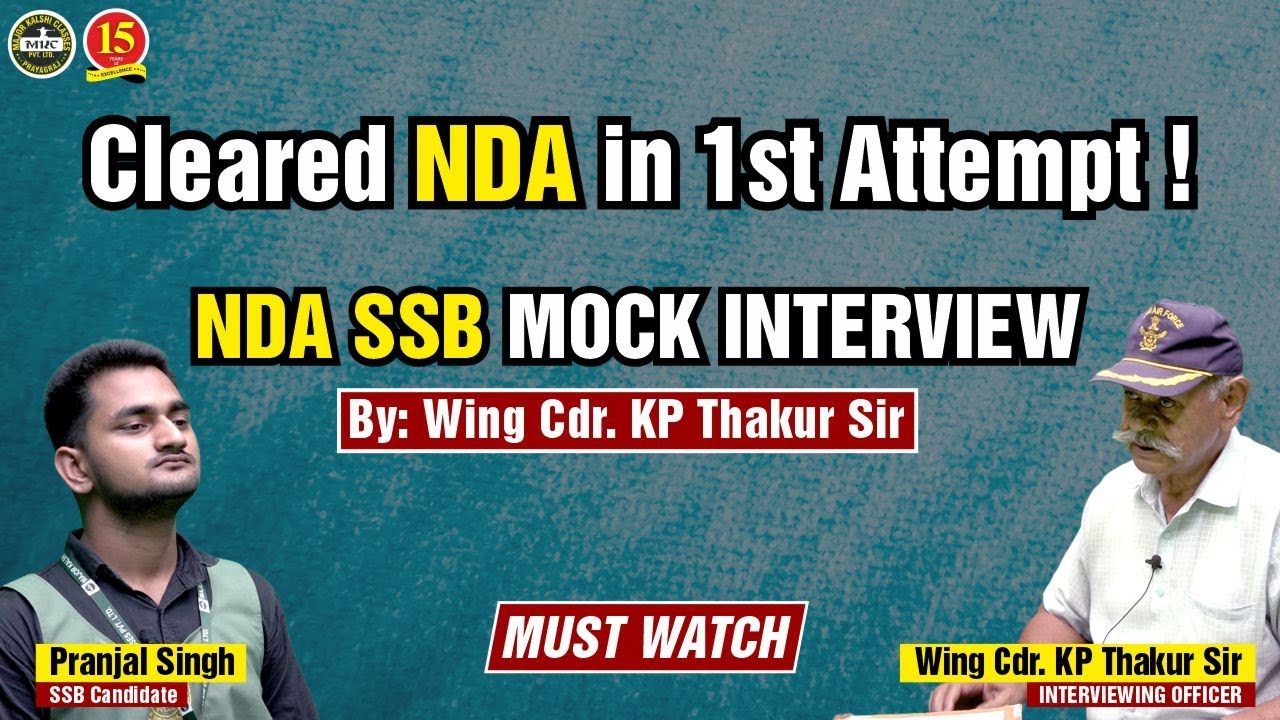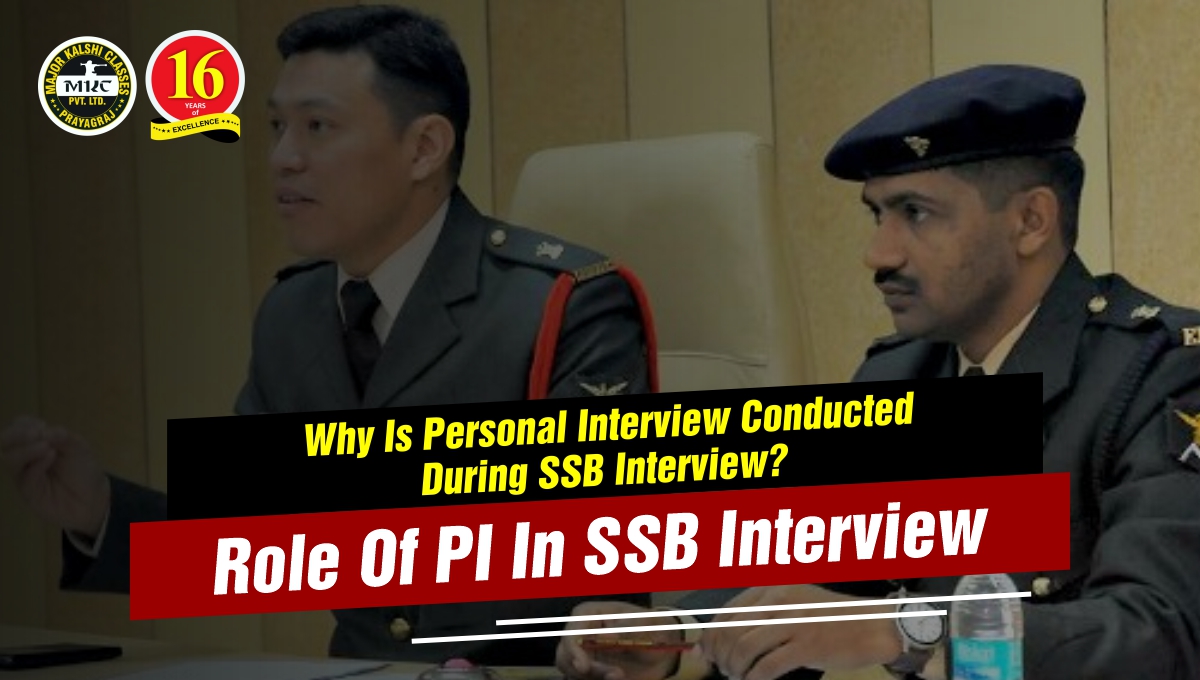Why is Personal Interview Conducted during SSB Interview ? | Role of PI in SSB Interview
Role of Personal Interview in SSB : The Personal Interview in the SSB (Services Selection Board) is crucial for assessing a candidate’s personality, communication skills, and suitability for a leadership role in the armed forces. It helps evaluate qualities like confidence, clarity of thought, and overall demeanor, aiding in the selection of capable and well-rounded officers. In this blog , we shall know in detail about the role of Personal Interview in SSB Interview .
What is SSB Interview ?
The SSB (Services Selection Board) interview is a comprehensive selection process used by the Indian Armed Forces to assess and select potential candidates for officer positions in the Army, Navy, and Air Force. It aims to evaluate not only the candidate’s aptitude and potential for leadership but also their personality traits, interpersonal skills, and suitability for a career in the armed forces.

The SSB interview is typically a 5-day procedure that consists of various tests, activities, and interactions. Here’s a breakdown of the 5-day SSB interview procedure:
1st Day – Reporting and Screening:
- On the first day, candidates arrive at the SSB center and undergo a registration and verification process.
- The day starts with a briefing about the SSB process and the schedule for the next few days.
- The candidates undergo a series of aptitude and intelligence tests, including verbal and non-verbal reasoning tests.
- Candidates who fail to meet the basic requirements or show inconsistencies in their documents are screened out.
2nd Day – Psychological Tests:
- This day focuses on psychological assessments to understand the candidate’s personality, thinking patterns, and responses to various situations.
- Tests like the Thematic Apperception Test (TAT), Word Association Test (WAT), Situation Reaction Test (SRT), and Self-Description Test (SDT) are conducted.
- These tests are designed to reveal the candidate’s thought process, emotional stability, and social compatibility.
Day 3 & 4 – Group Testing:
- These two days involve various group activities to evaluate the candidate’s teamwork, leadership, and problem-solving skills.
- Activities include group discussions, group planning exercises, group tasks, and an individual obstacle course.
- Assessors observe how candidates communicate, contribute to group goals, handle disagreements, and show leadership qualities.
Day 4 & 5 – Personal Interview and Conference:
- Candidates face a personal interview conducted by a panel of experienced officers. This interview delves into the candidate’s background, interests, opinions, and motivations for joining the armed forces.
- The interview panel assesses the candidate’s communication skills, confidence, and suitability for an officer role.
- On the final day, a conference is held where all assessors discuss and decide on each candidate’s suitability for selection.
- Candidates who are recommended by the conference move on to the medical examination phase.
Why Personal Interview is Conducted ?
Objectives of Personal Interview
The SSB interview checks different qualities of the candidate. These qualities are important for becoming an officer. The interview is a good way to check these qualities.
- First, they check OLQs, which are important qualities like intelligence, how well you express yourself, liveliness, and determination. These things are best checked during a personal interview. In the interview, the officer asks questions about different things. This helps them see these qualities in action.
Read Here – All GTO Tasks in SSB Interview [Detailed Explanation
- Second, they want to know about your personal life. The officer might ask about your family, friends, education, job, and other personal things. They also ask about the information you gave on your form. This helps them understand how well you know yourself and how clear your thoughts are.
- Third, the interview checks how well you can express yourself. It sees if you can explain your thoughts clearly. You should be able to say what you mean in a clear and short way.
- Fourth, they check if you believe in yourself. If you have self-confidence, you can explain yourself better. You need both good expression and self-confidence to do well in the interview.
- To see how fast the candidate can make decisions – The interview is not very long, only about 40-60 minutes. So, every question asked needs a quick answer. Sometimes, they might give the candidate different situations to see how they react. This helps the interviewer know if the candidate can make fast and smart decisions. SSB Personal Interview
- To see how much the candidate knows – The interview is a good way to check if the candidate knows what’s happening around them. This includes knowing about their surroundings, the people they meet often, and what’s going on in the country and the world. By asking different kinds of questions, the interviewer can easily see how well the candidate understands the world.
Do’s & Don’ts :
Do’s:
- Be Honest: Answer questions truthfully and honestly. Don’t exaggerate or provide false information.
- Stay Calm: Keep your composure and remain calm throughout the interview. Take a moment to gather your thoughts before responding.
- Listen Carefully: Pay attention to the questions being asked. Listen carefully before formulating your answers.
- Be Confident: Speak confidently and clearly. Maintain good posture and make eye contact with the interviewer.
- Be Positive: Focus on your strengths and achievements. Highlight your skills and qualities that make you suitable for an officer’s role.
- Give Examples: Support your answers with real-life examples from your experiences that showcase your qualities.
- Be Concise: Provide concise and relevant answers. Avoid rambling or going off-topic.
- Express Your Opinions: It’s okay to have opinions, but express them respectfully and logically.
- Ask Questions: If given the chance, ask thoughtful questions about the armed forces, the role of an officer, or any other relevant topic.
- Show Adaptability: Showcase your ability to adapt to new situations, environments, and challenges.
Don’ts:
- Don’t Lie: Never provide false information. If you’re caught lying, it can negatively impact your chances.
- Don’t Get Agitated: Even if faced with challenging questions, don’t lose your temper or get agitated.
- Avoid Negative Language: Stay away from negative language, and don’t badmouth anyone or anything.
- Don’t Be Overconfident: Confidence is good, but arrogance is not. Don’t come across as overly self-assured.
- Don’t Bluff: If you don’t know the answer to a question, it’s better to admit it rather than making something up.
- Don’t Be Defensive: If the interviewer challenges you, stay composed and respond thoughtfully rather than becoming defensive.
- Don’t Interrupt: Let the interviewer finish their question before you start answering. Interrupting can be seen as impolite.
- Avoid Generic Answers: Give specific and authentic answers rather than using generic statements that don’t reveal much about you.
- Don’t Discuss Controversial Topics: Avoid discussing controversial or sensitive subjects that might create unnecessary disagreements.
- Don’t Show Desperation: While you can express your eagerness to join, avoid coming across as desperate. Maintain your dignity and self-respect.








